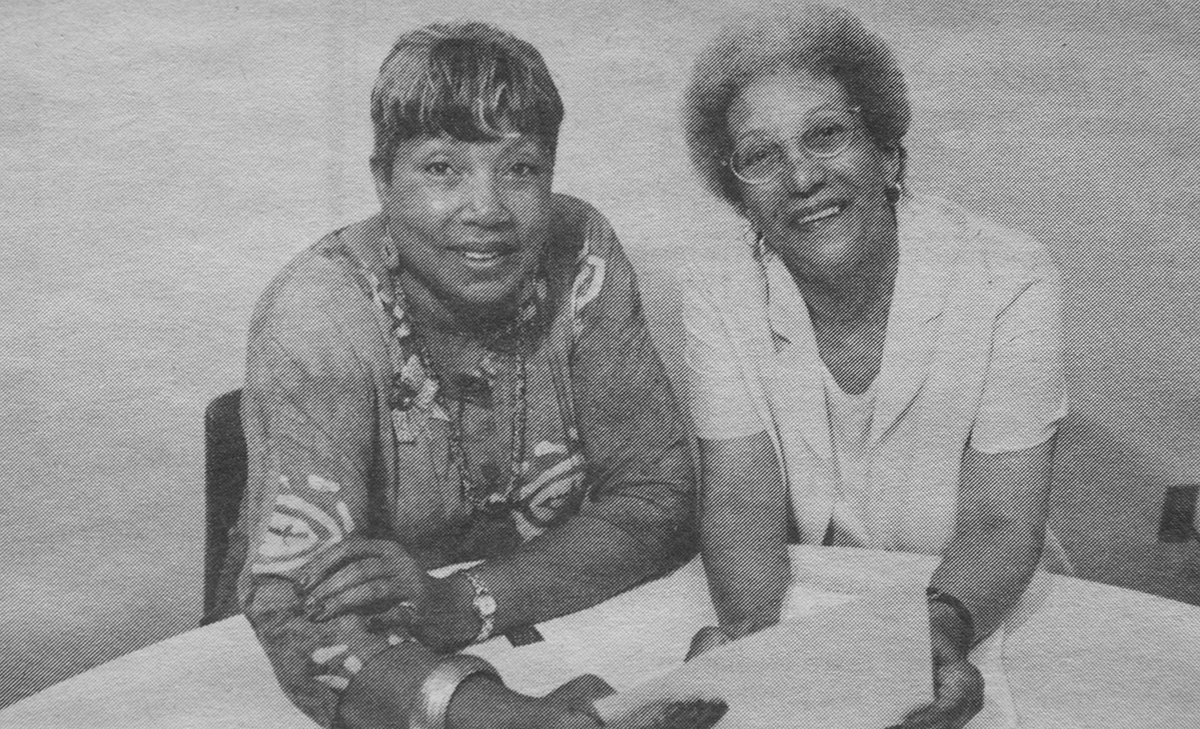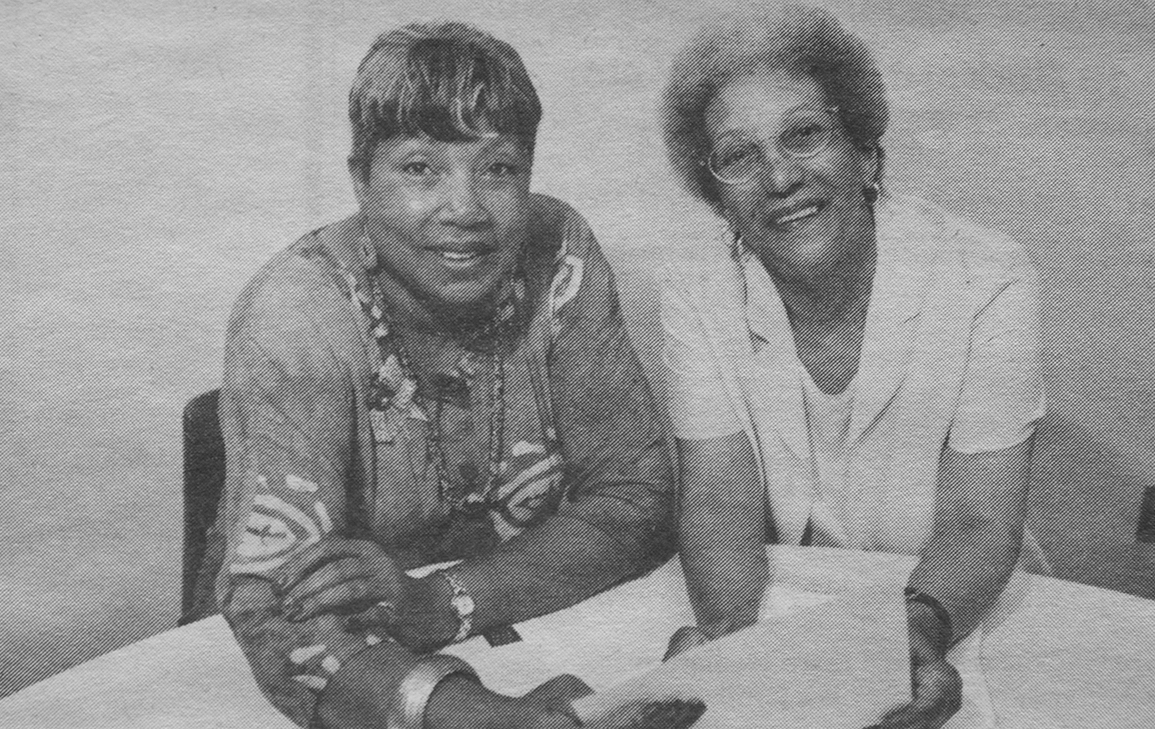
Lurline Baker-Kent, left, and Katie McWatt are two of more than 20 members of the newly organized local group Black Mothers United for Youth. “The total commitment and the total passion of women coming together for a common goal has created a strong bond among us,” Baker-Kent says. “We know what we have to do and we’re in it for the long haul.” Photo Terry Faust (1998)
The following story appeared in the May 27–June 9, 1998 issue of Minnesota Women’s Press. Twice per month in 2024, MWP is uplifting select pieces from our 39-year archive with a focus on longstanding issues. In tandem with our “Mental Health” print issue, our May focus is on mental well-being.
By now it is a commonplace saying: “It takes a village to raise a child.” Some repeat it, others even believe it. But one group of African American women actually live it.
Black Mothers United for Youth, founded three months ago by St. Paul community activist Victoria Davis, is a village committed to raising its children.
Davis said there was no single incident that prompted her to start the organization. Rather, her decision to act came out of a number of concerns that have accumulated over the years.
“Things have been smoldering among African American women for a number of years. It has been a layering of incidents that we talk about when we get together. I just decided to call a few people to say we need to do something,” Davis said.
The group’s voice is a collective one, drawing on the experience and expertise of, so far, more than 20 women from Minneapolis and St. Paul. It is a voice that refuses to be silent any longer, that calls for — even demands — change. It speaks to the entire community, not only African Americans, in the hope that others will join the conversation. “To stop the madness — that is the passion of this group,” said member Lurline Baker-Kent.
“Our children are our destiny. Our community’s future is tied to the future of our children. If we don’t take action to help them, we will all be lost. They need our support to be the best they can be.” – Willie Mae Wilson
The “madness” Baker-Kent refers to is a system and a society that negates, oppresses and ignores African Americans, especially youth, according to Davis. “On all scales bad, African American youth ran at the top. And on all scales good, they rank at the bottom,” she said. By initiating dialogue with the whole community, Davis hopes that people outside the African American community will come to view an investment in African American youth as an investment in the entire community.
“There is something magical about touching another’s human experience,” Davis said. “When that occurs, something good always happens.”
Willie Mae Wilson, president of the St. Paul Urban League and a member of the group, explained why members are working to create this greater good. “Our children are our destiny. Our community’s future is tied to the future of our children. If we don’t take action to help them, we will all be lost. They need our support to be the best they can be.”
As understood by the group, this support is most crucial in the areas of criminal justice and education, where African American youth are “caught in a quagmire,” Davis said. She maintained that everything within those systems works to push African American youth down. “Black Mothers United For Youth is a vehicle through which the African American community can respond to the issues that negatively impact our youth.”
One of those issues is the number of African American youth caught up in the criminal justice system. Baker-Kent, who recently retired as the state’s assistant commissioner of corrections and now works at Hamline University as executive director for the Center for Excellence in Urban Teaching, said she is concerned about the extensive incarceration rate of African American youth.
County officials do not have exact figures for what that rate is, but one indicator of African American youth’s involvement in the criminal justice system is the number of youth who are on probation. According to county figures, in Ramsey County in 1997 31 percent of all juveniles on probation were African American; in Hennepin County, the number is nearly 38 percent.
“We are willing to lock our kids up. We are not looking at early intervention and prevention. We are not making an effort to integrate those leaving the criminal justice system into the wider community,” Baker-Kent said.
Baker-Kent is also concerned with how policies are made at the local and state levels. “If the people developing policy are mostly white, the last thing they are going to think about is how those policies will impact African Americans. As citizens, we should be active. We should drive policy that positively impacts our youth. It is time for us to be at the table.”
Black Mothers United for Youth has responded to Baker-Kent’s call. During the recent legislative session members alerted their community through a petition drive to nine pieces of criminal legislation they believe is particularly devastating to the African American community. According to Davis, one proposal would have given a mandatory jail sentence of five years to anyone charged with a felony who failed to appear in court. Davis said, “We feel that this violation of our constitutional right to due process. People should be given a chance to explain.”
“It is a dangerous time for young people of color. I think that society has turned away from its commitment to be a fair one, not just racially, but economically. We must band together to try and make this a better place.” – Katie McWatt
Another piece of education legislation that caused concern called for a baseline of test scores against which schools are measured. If students’ performance doesn’t meet those standards, the school has four weeks to improve before it is taken over by the state.
“We think that direction is a thoughtless approach to improving education,” she said. “We feel that the best way to improve schools is to involve families and communities. If a school isn’t successful, it should partner with the community to improve it.”
After hearing from Black Mothers United for Youth, several hundred citizens stepped up to the plate. They signed petitions protesting the proposals and Black Mothers United for Youth delivered them to the Legislature. It was action that Davis hopes will be repeated as the group works to develop a “communication infrastructure and rapid response system” within the African American community. By creating such a network, Davis hopes to deliver important information to a large group of people in a short amount of time.
For right now, the group will continue to focus on education and criminal justice, two areas Baker-Kent believes go hand in hand. “If children receive a good education, if children stay in school and learn while they are there, they will develop some of the self-esteem necessary to stay out of the criminal justice system.”
Echoing her colleagues, Katie McWatt, first vice president of the National Association for the Advancement of Colored People (NAACP), said the group’s focus on criminal justice and education is especially important right now. “It is a dangerous time for young people of color,” she said. “I think that society has turned away from its commitment to be a fair one, not just racially, but economically. We must band together to try and make this a better place. All of the members [of Black Mothers United for Youth] have been to the front lines of battle before. We have got to try again.”
This shared passion and struggle among sisters is one of the powerful bonds that holds this group of women together. “Some of the best friends you ever make are those who work with you for a cause,” McWatt said.
Baker-Kent agreed. “The total commitment and the total passion of women coming together for a common goal has created a strong bond among us. We know what we have to do, and we’re in it for the long haul.”
For all of its members, it is the shared experience of motherhood that gives the group its identity and power. “We bought these children into the world,” Davis said. “We feel their pain and share it with them.”
According to Baker-Kent, it is Black mothers who have historically been the root of the African American community. “We need to go back to our history and our roots,” she explained. “We need to know again that every child belongs to every mother, that it’s not just about my kids. Black Mothers United for Youth is moving toward that concept.”
— May 1998




